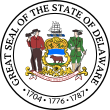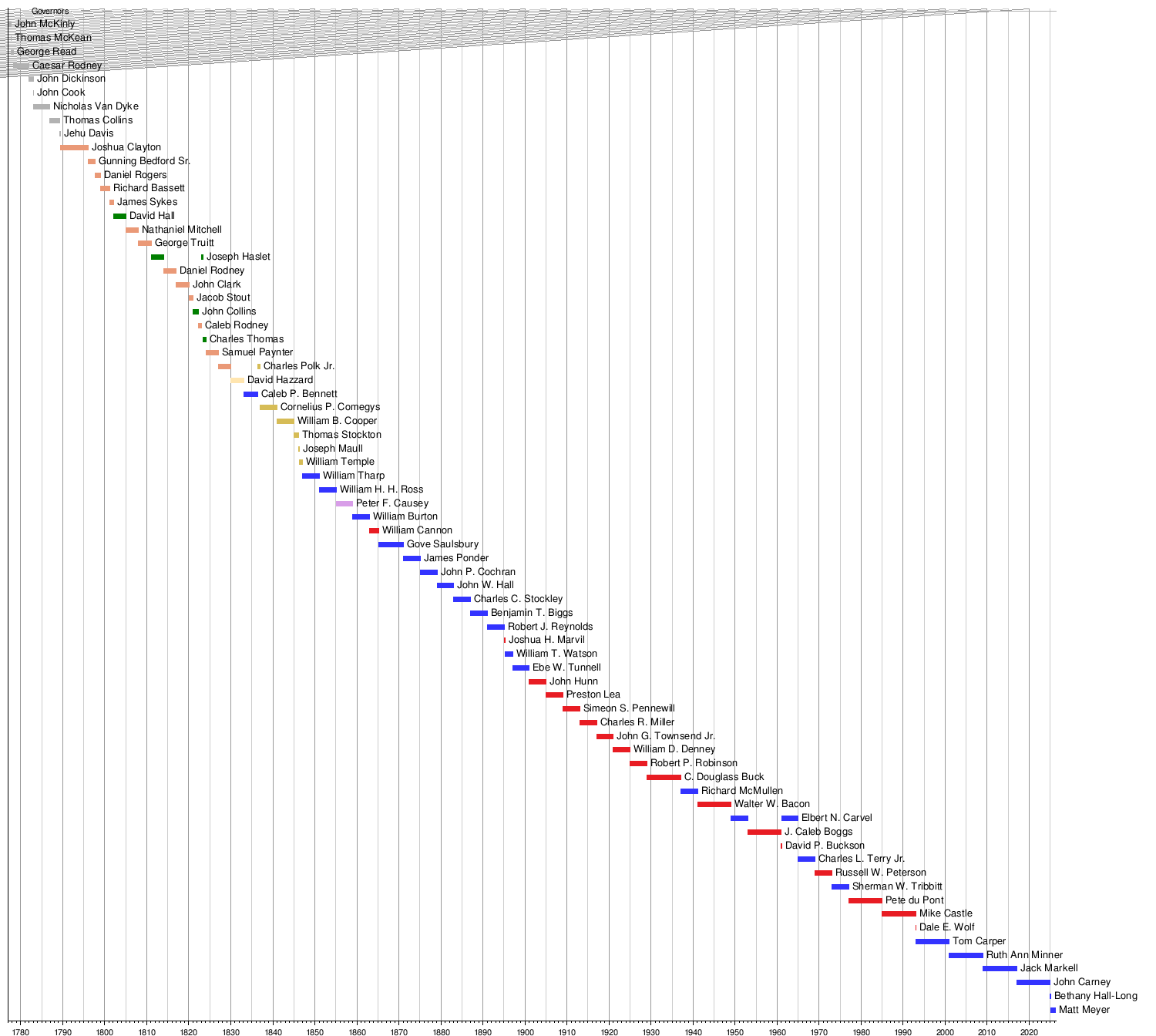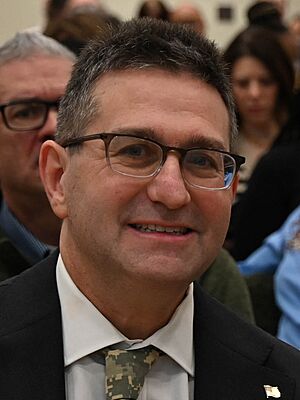List of governors of Delaware facts for kids
Quick facts for kids Governor of Delaware |
|
|---|---|

|
|
| Government of Delaware | |
| Style | The Honorable |
| Residence | Delaware Governor's Mansion Dover, Delaware |
| Term length | Four years, renewable once |
| Inaugural holder | John McKinly |
| Formation | February 12, 1777 |
| Succession | Line of succession |
| Deputy | Lieutenant Governor of Delaware |
| Salary | $171,000 (2013) |
The Governor of Delaware is the main leader of Delaware's government. They are also in charge of the state's military forces, like the Delaware National Guard. The Governor's job is to make sure state laws are followed. They can also approve new laws or say no to them (this is called a veto). The Governor can call the state lawmakers together and can forgive people for certain crimes, but not in all cases.
From 1776 to 1792, this leader was called the President of Delaware.
Many people have served as Governor of Delaware. There have been 71 different people who held the job, serving 74 times in total. Some, like Joseph Haslet, Charles Polk Jr., and Elbert N. Carvel, served more than once but not right after each other. Sadly, Henry Molleston was elected but passed away before he could start his term.
Only four governors have been elected to serve two terms in a row. The person who served the longest was Ruth Ann Minner. She was Governor for just over eight years. The shortest term was held by Bethany Hall-Long, who served for 15 days after the previous Governor resigned. Dale E. Wolf served 18 days, and David P. Buckson served 19 days in similar situations.
The current Governor is Matt Meyer, a Democrat. He started his term on January 21, 2025.
Contents
History of Delaware's Governors
Before 1776, Delaware was a colony of Great Britain. It was managed by governors from Pennsylvania.
From President to Governor
In 1776, after Delaware and the other Thirteen Colonies declared independence, Delaware created its first state constitution. This constitution set up the job of "President of Delaware." This leader was chosen by the state lawmakers and served for three years. They could not be president again until three years had passed after their term ended.
In 1792, a new constitution changed the name of the office from President to Governor. It also set the start date for a Governor's term to the third Tuesday in January after an election. Governors could only serve three out of any six years.
The 1831 constitution made the term four years long, but governors could only serve one term. The current constitution from 1897 allows governors to serve two terms.
Who Takes Over?
The 1776 constitution said that if the President's job became empty, the speaker of the legislative council would become a "vice-president." The 1792 constitution stated that the speaker of the senate would take over. The 1897 constitution created the job of Lieutenant Governor. If the Governor's office becomes empty, the Lieutenant Governor takes over. The Governor and Lieutenant Governor are elected at the same time, but they don't run as a team on the same ballot.
| No. | Governor | Term in office | Party | Election | Lt. Governor | |||
|---|---|---|---|---|---|---|---|---|
| 1 |  |
John McKinly (1721–1796) |
February 21, 1777 – September 12, 1777 (arrested and removed) |
No parties | 1777 | Office did not exist | ||
| 2 |  |
Thomas McKean (1734–1817) |
September 12, 1777 – October 20, 1777 (successor took office) |
Speaker of the Assembly acting as vice-president |
||||
| 3 |  |
George Read (1733–1798) |
October 20, 1777 – March 31, 1778 (did not run) |
Speaker of the Legislative Council serving as vice-president |
||||
| 4 |  |
Caesar Rodney (1728–1784) |
March 31, 1778 – November 13, 1781 (term-limited) |
1778 | ||||
| 5 |  |
John Dickinson (1732–1808) |
November 13, 1781 – January 13, 1783 (resigned) |
1781 | ||||
| 6 |  |
John Cook (1730–1789) |
January 13, 1783 – February 8, 1783 (did not run) |
Speaker of the Legislative Council serving as vice-president |
||||
| 7 |  |
Nicholas Van Dyke (1738–1789) |
February 8, 1783 – October 28, 1786 (term-limited) |
1783 (special) |
||||
| 8 |  |
Thomas Collins (1732–1789) |
October 28, 1786 – March 29, 1789 (died in office) |
1786 | ||||
| 9 |  |
Jehu Davis (1738–1802) |
March 29, 1789 – June 2, 1789 (did not run) |
Speaker of the Legislative Council serving as vice-president |
||||
| 10 |  |
Joshua Clayton (1744–1798) |
June 2, 1789 – January 13, 1796 (term-limited) |
Federalist | 1789 | |||
| 1792 | ||||||||
| 11 |  |
Gunning Bedford Sr. (1742–1797) |
January 13, 1796 – September 28, 1797 (died in office) |
Federalist | 1795 | |||
| 12 |  |
Daniel Rogers (1754–1806) |
September 28, 1797 – January 9, 1799 (successor took office) |
Federalist | Speaker of the Senate acting |
|||
| 13 |  |
Richard Bassett (1745–1815) |
January 9, 1799 – March 3, 1801 (resigned) |
Federalist | 1798 | |||
| 14 |  |
James Sykes (1761–1822) |
March 3, 1801 – January 19, 1802 (successor took office) |
Federalist | Speaker of the Senate acting |
|||
| 15 |  |
David Hall (1752–1817) |
January 19, 1802 – January 15, 1805 (term-limited) |
Democratic- Republican |
1801 | |||
| 16 |  |
Nathaniel Mitchell (1753–1814) |
January 15, 1805 – January 19, 1808 (term-limited) |
Federalist | 1804 | |||
| 17 |  |
George Truitt (1756–1818) |
January 19, 1808 – January 15, 1811 (term-limited) |
Federalist | 1807 | |||
| 18 |  |
Joseph Haslet (1769–1823) |
January 15, 1811 – January 18, 1814 (term-limited) |
Democratic- Republican |
1810 | |||
| 19 |  |
Daniel Rodney (1764–1846) |
January 18, 1814 – January 21, 1817 (term-limited) |
Federalist | 1813 | |||
| 20 |  |
John Clark (1761–1821) |
January 21, 1817 – January 15, 1820 (resigned) |
Federalist | 1816 | |||
| — |  |
Henry Molleston (1762–1819) |
Died before taking office |
Federalist | 1819 | |||
| 21 |  |
Jacob Stout (1764–1855) |
January 15, 1820 – January 16, 1821 (successor took office) |
Federalist | Speaker of the Senate acting |
|||
| 22 |  |
John Collins (1776–1822) |
January 16, 1821 – April 16, 1822 (died in office) |
Democratic- Republican |
1820 (special) |
|||
| 23 |  |
Caleb Rodney (1767–1840) |
April 23, 1822 – January 21, 1823 (did not run) |
Federalist | Speaker of the Senate acting |
|||
| 24 |  |
Joseph Haslet (1769–1823) |
January 21, 1823 – June 20, 1823 (died in office) |
Democratic- Republican |
1822 | |||
| 25 |  |
Charles Thomas (1790–1848) |
June 20, 1823 – January 20, 1824 (successor took office) |
Democratic- Republican |
Speaker of the Senate acting |
|||
| 26 |  |
Samuel Paynter (1768–1845) |
January 20, 1824 – January 16, 1827 (term-limited) |
Federalist | 1823 (special) |
|||
| 27 |  |
Charles Polk Jr. (1788–1857) |
January 16, 1827 – January 19, 1830 (term-limited) |
Federalist | 1826 | |||
| 28 |  |
David Hazzard (1781–1864) |
January 19, 1830 – January 15, 1833 (term-limited) |
National Republican |
1829 | |||
| 29 |  |
Caleb P. Bennett (1758–1836) |
January 15, 1833 – May 9, 1836 (died in office) |
Democratic | 1832 | |||
| 30 |  |
Charles Polk Jr. (1788–1857) |
May 9, 1836 – January 17, 1837 (successor took office) |
Whig | Speaker of the Senate acting |
|||
| 31 |  |
Cornelius P. Comegys (1780–1851) |
January 17, 1837 – January 19, 1841 (term-limited) |
Whig | 1836 | |||
| 32 |  |
William B. Cooper (1771–1849) |
January 19, 1841 – January 21, 1845 (term-limited) |
Whig | 1840 | |||
| 33 |  |
Thomas Stockton (1781–1846) |
January 21, 1845 – March 2, 1846 (died in office) |
Whig | 1844 | |||
| 34 |  |
Joseph Maull (1781–1846) |
March 2, 1846 – May 3, 1846 (died in office) |
Whig | Speaker of the Senate acting |
|||
| 35 |  |
William Temple (1814–1863) |
May 6, 1846 – January 19, 1847 (successor took office) |
Whig | Speaker of the Senate acting |
|||
| 36 |  |
William Tharp (1803–1865) |
January 19, 1847 – January 21, 1851 (term-limited) |
Democratic | 1846 (special) |
|||
| 37 |  |
William H. H. Ross (1814–1887) |
January 21, 1851 – January 16, 1855 (term-limited) |
Democratic | 1850 | |||
| 38 |  |
Peter F. Causey (1801–1871) |
January 16, 1855 – January 18, 1859 (term-limited) |
American | 1854 | |||
| 39 |  |
William Burton (1789–1866) |
January 18, 1859 – January 20, 1863 (term-limited) |
Democratic | 1858 | |||
| 40 |  |
William Cannon (1809–1865) |
January 20, 1863 – March 1, 1865 (died in office) |
Union | 1862 | |||
| 41 |  |
Gove Saulsbury (1815–1881) |
March 1, 1865 – January 17, 1871 (term-limited) |
Democratic | Speaker of the Senate acting |
|||
| 1866 | ||||||||
| 42 |  |
James Ponder (1819–1897) |
January 17, 1871 – January 19, 1875 (term-limited) |
Democratic | 1870 | |||
| 43 |  |
John P. Cochran (1809–1898) |
January 19, 1875 – January 21, 1879 (term-limited) |
Democratic | 1874 | |||
| 44 |  |
John W. Hall (1817–1892) |
January 21, 1879 – January 16, 1883 (term-limited) |
Democratic | 1878 | |||
| 45 |  |
Charles C. Stockley (1819–1901) |
January 16, 1883 – January 18, 1887 (term-limited) |
Democratic | 1882 | |||
| 46 |  |
Benjamin T. Biggs (1821–1893) |
January 18, 1887 – January 20, 1891 (term-limited) |
Democratic | 1886 | |||
| 47 |  |
Robert J. Reynolds (1838–1909) |
January 20, 1891 – January 15, 1895 (term-limited) |
Democratic | 1890 | |||
| 48 |  |
Joshua H. Marvil (1825–1895) |
January 15, 1895 – April 8, 1895 (died in office) |
Republican | 1894 | |||
| 49 |  |
William T. Watson (1849–1917) |
April 8, 1895 – January 19, 1897 (successor took office) |
Democratic | Speaker of the Senate acting |
|||
| 50 |  |
Ebe W. Tunnell (1844–1917) |
January 19, 1897 – January 15, 1901 (did not run) |
Democratic | 1896 | |||
| 51 |  |
John Hunn (1849–1926) |
January 15, 1901 – January 17, 1905 (did not run) |
Republican | 1900 | Philip L. Cannon | ||
| 52 |  |
Preston Lea (1841–1916) |
January 17, 1905 – January 19, 1909 (did not run) |
Republican | 1904 | Isaac T. Parker | ||
| 53 |  |
Simeon S. Pennewill (1867–1935) |
January 19, 1909 – January 21, 1913 (did not run) |
Republican | 1908 | John M. Mendinhall | ||
| 54 |  |
Charles R. Miller (1857–1927) |
January 21, 1913 – January 16, 1917 (did not run) |
Republican | 1912 | Colen Ferguson | ||
| 55 |  |
John G. Townsend Jr. (1871–1964) |
January 16, 1917 – January 18, 1921 (did not run) |
Republican | 1916 | Lewis E. Eliason | ||
| 56 |  |
William D. Denney (1873–1953) |
January 18, 1921 – January 20, 1925 (did not run) |
Republican | 1920 | J. Danforth Bush | ||
| 57 |  |
Robert P. Robinson (1869–1939) |
January 20, 1925 – January 15, 1929 (did not run) |
Republican | 1924 | James H. Anderson | ||
| 58 |  |
C. Douglass Buck (1890–1965) |
January 15, 1929 – January 19, 1937 (term-limited) |
Republican | 1928 | James H. Hazel | ||
| 1932 | Roy F. Corley | |||||||
| 59 |  |
Richard McMullen (1868–1944) |
January 19, 1937 – January 21, 1941 (did not run) |
Democratic | 1936 | Edward W. Cooch | ||
| 60 |  |
Walter W. Bacon (1880–1962) |
January 21, 1941 – January 18, 1949 (term-limited) |
Republican | 1940 | Isaac J. MacCollum | ||
| 1944 | Elbert N. Carvel | |||||||
| 61 |  |
Elbert N. Carvel (1910–2005) |
January 18, 1949 – January 20, 1953 (lost election) |
Democratic | 1948 | Alexis I. du Pont Bayard | ||
| 62 |  |
J. Caleb Boggs (1909–1993) |
January 20, 1953 – December 30, 1960 (resigned) |
Republican | 1952 | John W. Rollins | ||
| 1956 | David P. Buckson | |||||||
| 63 |  |
David P. Buckson (1920–2017) |
December 30, 1960 – January 17, 1961 (successor took office) |
Republican | Succeeded from lieutenant governor |
Vacant | ||
| 64 |  |
Elbert N. Carvel (1910–2005) |
January 17, 1961 – January 19, 1965 (term-limited) |
Democratic | 1960 | Eugene Lammot | ||
| 65 |  |
Charles L. Terry Jr. (1900–1970) |
January 19, 1965 – January 21, 1969 (lost election) |
Democratic | 1964 | Sherman W. Tribbitt | ||
| 66 |  |
Russell W. Peterson (1916–2011) |
January 21, 1969 – January 16, 1973 (lost election) |
Republican | 1968 | Eugene Bookhammer | ||
| 67 |  |
Sherman W. Tribbitt (1922–2010) |
January 16, 1973 – January 18, 1977 (lost election) |
Democratic | 1972 | |||
| 68 |  |
Pete du Pont (1935–2021) |
January 18, 1977 – January 15, 1985 (term-limited) |
Republican | 1976 | James D. McGinnis | ||
| 1980 | Mike Castle | |||||||
| 69 |  |
Mike Castle (b. 1939) |
January 15, 1985 – January 2, 1993 (resigned) |
Republican | 1984 | Shien Biau Woo | ||
| 1988 | Dale E. Wolf | |||||||
| 70 |  |
Dale E. Wolf (1924–2021) |
January 3, 1993 – January 19, 1993 (successor took office) |
Republican | Succeeded from lieutenant governor |
Vacant | ||
| 71 |  |
Tom Carper (b. 1947) |
January 19, 1993 – January 3, 2001 (resigned) |
Democratic | 1992 | Ruth Ann Minner | ||
| 1996 | ||||||||
| 72 |  |
Ruth Ann Minner (1935–2021) |
January 3, 2001 – January 20, 2009 (term-limited) |
Democratic | Succeeded from lieutenant governor |
Vacant | ||
| 2000 | John Carney | |||||||
| 2004 | ||||||||
| 73 |  |
Jack Markell (b. 1960) |
January 20, 2009 – January 17, 2017 (term-limited) |
Democratic | 2008 | Matthew Denn (resigned January 6, 2015) |
||
| 2012 | ||||||||
| Vacant | ||||||||
| 74 |  |
John Carney (b. 1956) |
January 17, 2017 – January 7, 2025 (resigned) |
Democratic | 2016 | Bethany Hall-Long | ||
| 2020 | ||||||||
| 75 |  |
Bethany Hall-Long (b. 1963) |
January 7, 2025 – January 21, 2025 (successor took office) |
Democratic | Succeeded from lieutenant governor |
Vacant | ||
| 76 |  |
Matt Meyer (b. 1971) |
January 21, 2025 – Incumbent |
Democratic | 2024 | Kyle Evans Gay | ||
Timeline of Governors
| Timeline of Delaware governors |
 |
More to Explore
- Delaware gubernatorial elections
- Gubernatorial lines of succession in the United States#Delaware
 | Misty Copeland |
 | Raven Wilkinson |
 | Debra Austin |
 | Aesha Ash |


